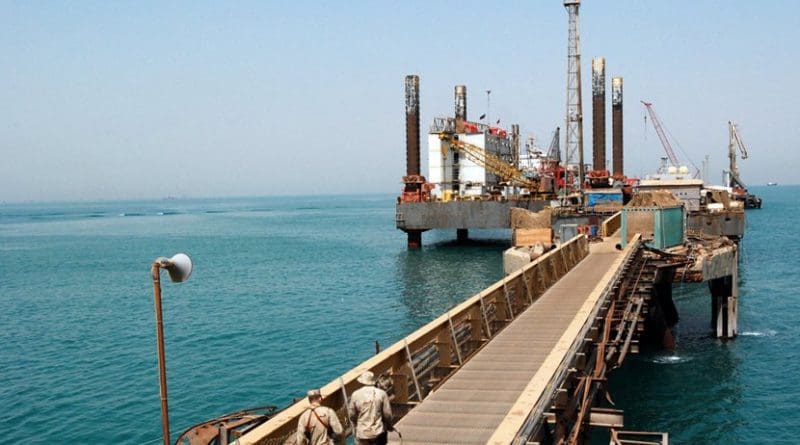Unrest In Basra, Khuzestan Symptoms Of A Troubled Region – Analysis
The US State Department last week temporarily closed the US consulate in Basra and evacuated all diplomats stationed there following a rocket attack launched by Iranian-backed forces. In addition, Basra’s airport has faced mortar fire. The consulate closure is symptomatic of the larger issues of upheaval along the northern Arabian Gulf, where there is an ongoing shift in the landscape.
Beginning in July, hundreds of protesters appeared on the streets of Basra demanding much-needed government services and lambasting the rampant corruption in the city. Basra is one of the top two sources of petroleum revenues for Baghdad — second only to Kirkuk in Northern Iraq — with the port city shipping three million barrels of Iraqi oil to global markets on a daily basis. Upheaval is not conducive to Basra’s oil production.
In an attempt to quell the violence and restore order in Basra and the surrounding areas, such as Amarah, Nasiriyah and Najaf, Prime Minister Haider Abadi ordered units from the Iraqi Army 9th Division and its counterterrorism forces into the region. Abadi also made the controversial decision to cut all internet access to keep protest organizers from rallying more followers to their cause.
From the US perspective, Secretary of State Mike Pompeo blames Iran’s elite Quds Force and militias under the control of Quds Force commander Qassem Soleimani for the upheaval and closure of the consulate. Basra’s residents also blame Iranian meddling in the city’s affairs. Last month, protesters turned their rage on neighboring Iran, blaming its outsized influence on Iraq’s political affairs for their misery. They stormed the Iranian consulate and set it on fire, causing significant damage. Buildings belonging to powerful Iran-backed militias have also been burned, while videos have shown banners depicting Iranian spiritual and political leaders being set aflame.
Meanwhile, the attack on an Iranian military parade in Ahvaz on Sept. 22, which left 25 dead, marked the latest sign of instability in Iran’s oil-rich southwestern province of Khuzestan. Regardless of whether Daesh or an anti-government Arab faction carried out the attack, Arab separatist groups, including the Arab Struggle Movement for the Liberation of Ahvaz, have for years targeted regime forces, government buildings and energy infrastructure in the province. Iran’s Khuzestan is often referred to Arabistan.
These armed separatists draw support from Ahwazi Arabs, largely due to grievances stemming from unemployment, poverty, water shortages, power outages, and environmental hazards. Iranian Arabs in Khuzestan have deep cultural links with Arabs in Iraq and especially in Basra. Indeed, the northern Gulf is in deep trouble geopolitically.
Strategically located on the Shatt Al-Arab, next to Iraq’s Basra, and possessing 90 percent of Iran’s oil reserves, Khuzestan is vitally important for Iran’s economy, just as Basra is for Iraq. Iran’s leadership blames the US and more than one Arab Gulf state for the Ahvaz attack, which American officials deny. But the tension is building for a response and Iran has fired missiles toward groups in Syria that it blames for the attack.
What does all of this mean? The destabilization of the northern Gulf between Iraq and Iran is likely to continue to grow as geopolitics affects the composition and landscape of this geographically significant oil-producing area. As tensions build in this area, the security and safety of the northern Gulf will become more relevant to the regional players, especially those that protect its maritime security.
The US is already actively training with the Iraqi and Kuwaiti navies for additional maritime security duties. A recent exercise focused on improving collective proficiency in maritime security tactics between the three nations and ensuring the freedom of navigation throughout the US Fifth Fleet’s area of operations. To make the point clear, an impressive array of naval craft — including US guided-missile destroyer USS The Sullivans, coastal patrol ships USS Tempest and USS Chinook, US Coast Guard Island-class patrol boat USCGC Monomoy, Iraqi navy patrol boat P-303, and Kuwaiti navy patrol boat KNS Al-Garoh — took part. The Sullivans led command and control of each event throughout the exercise.
The training included live-fire gunnery exercises, visit, board, search and seizure team training, maritime infrastructure protection drills, search and rescue training, and high-value unit protection operations. Clearly, this trilateral training is part of creating the necessary maritime protection force while Basra and Ahvaz undergo dramatic change.
Overall, the temporary closure of the Basra consulate is tied to bigger issues in the region and particularly the role of the Iranian government in Iraq’s south. But Tehran’s problems with Khuzestan must be added to the mix and thus a collision point is emerging in this strategic area of the northern Gulf.

